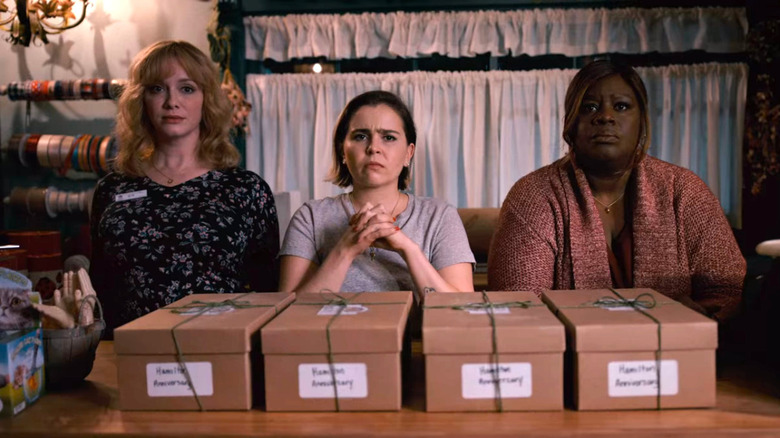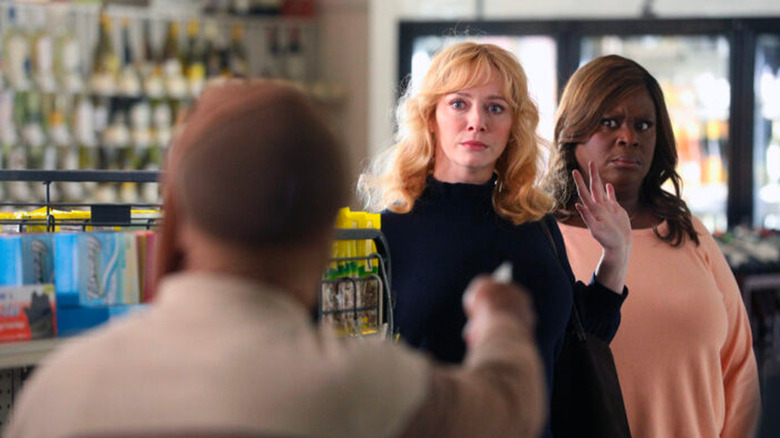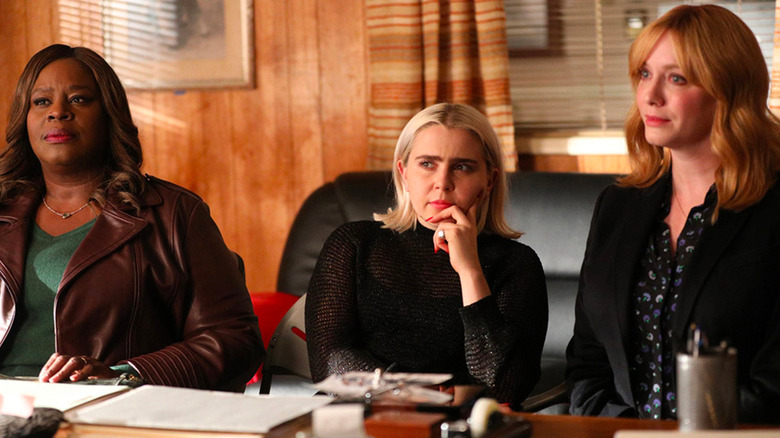Good Girls Creator Used Breaking Bad As A Lesson In What Not To Do
If the success of shows like "Breaking Bad" is any indication, audiences love to watch good guys turn to the dark side. The corruption arc was a staple in prestige TV before the hit show of course, but Walter White's wild, debauched descent has since become a blueprint for some writers — or an example of what others would like to avoid.
Jenna Bans, the creator of "Good Girls," is no stranger to pitting a flawed (but nuanced!) character against rapidly-debilitating odds. Bans cut her teeth on Shondaland shows like "Grey's Anatomy" and "Scandal," where she learned the tricks of soapy storytelling firsthand. And not unlike "Scandal," "Good Girls" follows a group of characters caught in a mess that they have to fight tooth and nail to escape from. But where the former introduces its characters right in the thick of said mess, "Good Girls" borrows a page from the book of "Breaking Bad," and launches its story from the moment its heroes decide to, well ... break bad.
Though each show explores the slippery slope of crime in its own way, that's more or less where the similarities end. For Bans, setting "Good Girls" apart from the White's downward spiral in "Breaking Bad" was a conscious choice, and a key to creating some juicy conflict for her heroes.
Good Girls had its limits
"Good Girls" follows Beth (Christina Hendricks), her sister Annie (Mae Whitman), and their best friend Ruby (Retta) — three mothers with their backs against the wall in various ways. Their first foray into the world of crime is driven entirely out of desperation: They've played by the rules all their life, and it clearly never got them anywhere. Their decision to rob the grocery store where Annie works is a strategic one, as much for its low risk as it is for the high reward. Though they learn pretty quickly that it's impossible to dabble in crime without getting your hands dirty, it was important to Bans that their moral centers remained intact (more or less) throughout the series.
Right out the gate, that set "Good Girls" apart from "Breaking Bad." Seeing how far Walter White was willing to take his rapidly-progressing criminal enterprise was a big selling point to the series. "It didn't take that much for him to become not a good person," Bans told Variety. It was rare, at the time, to see someone giving in to their baser urges so willingly — and letting all chance of redemption slip away entirely — but it made for uber-binge-able television. Beth, Ruby, and Annie, on the other hand, couldn't go too far, too fast:
"I think these women are good people, and they have strong moral centers and they are still mothers and taking care of their family and lives ... I think the conflict in the show for us comes from them struggling to still be good people while they are in these heightened situations and they've broken the law and gotten themselves in some hot water."
Drawing the line
Of course, the good girls aren't able to stay good for very long. Their very first robbery sets off a chain reaction that forces them into situations they never thought they'd find themselves in. The trick for the "Good Girls" writers' room was in finding just how far their characters were able to go. "We don't want them to lose their moral centers," Bans explained. "The [characters] even talk about that by the [season 1] finale: 'How far are we going to go here? Once we cross this line there's no going back.'"
That struggle helped create a fair amount of tension throughout the series' four-season run, and even some comedy as well. "What always strikes me as funny is the absurdity of real people in really absurd situations," Bans continued. "I thought if I could make these characters as grounded and real and interesting as possible and just throw them into these heightened situations, they'll do the rest."
And Bans definitely thought right. The criminal intrigue laced throughout "Good Girls" was definitely a big part of its appeal, but so was the understated humor of its incredible cast — which often helped to sell even the direst developments. There hasn't been quite a show like it, either before or since, and it has a lot to do with the thoughtful approach that Bans and her team took to such a time-worn trope.


